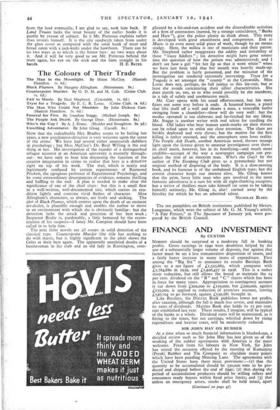The Colours of Their Trade
Exit to Music. By Neal Shepherd. (Constable. 75. 6d.) Now that the redoubtable Mrs. Bradley seems to be feeling her years, a new psychiatrist-detective is very welcome upon the scene of the crime. We have had several rather amateurish dabblers in psychology ; but Miss McCloy's Dr. Basil Willing is the real thing at last. His investigation of the murder of a distinguished refugee scientist at an American university is masterly through- out : we have only to hear him discussing the function of the creative imagination in crime to realise that here is a detective right on top of his work. The trail, which is neatly and legitimately confused by certain experiments of Raymond Prickett, the egregious professor of Experimental Psychology, and by some extraordinary discrepancies of evidence, remains thrilling and baffling to the end. A plan is needed to make clear the significance of one of the chief clues : but this is a small flaw in a well-written, well-documented tale, which carries its eru- dition lightly and contains vivid flashes of character. Miss Allingham's characters, as always, are lively and striking. The plot of Black Plumes, which centres upon the death of an eminent art-dealer, is plausible enough and enables the author to move in an environment with which she is obviously familiar : but the detection lacks the attack and precision of her best work ; Inspector Bridie is, pardonably, a little bemused by the eccen- tricities of his suspects—I fancy Mr. Campion should have been called in to help him.
The next three novels are all essays in solid detection of the classical type. Counterpoint Murder (the title has nothing to do with music, but is highly significant to the plot) shows the Coles at their best again. The apparently unrelated deaths of a businessman in his club and an old lady in Kensington, com- plicated by a hit-and-run accident and the discreditable activities of a firm of contractors (named, by a strange coincidence, " Burke and Hare "), give the police plenty to think about. This story is developed with great smoothness and competence. Exit to Music is an even more solid piece of work, though by no means stodgy. Here, the milieu is one of musicians and their patron. Mr. Shepherd rather exaggerates the oddity and irritability of these " lousy fiddlers " ; his detective might have gone sooner into the question of how the poison was administered; and I don't see how a girl " bit her lip so that it went white " when we have just been told that her mouth was heavily made-up. But the problem is fairly presented, and the minutiae of the investigation are rendered extremely interesting. Tryst for a Tragedy is set amongst the " county " in the Cotswolds. Miss Lorac does not, perhaps, do full justice to this lay-out; but at least she avoids caricaturing their sillier characteristics. She does puzzle us, too, as to who could possibly be the murderer, in a tale of subtle and unobtrusive merit.
Mr. Carr opens with his usual effervescence, but his story fizzes out some way before it ends. A haunted house, a pistol that lifts itself off a wall and shoots a man, a venerable butler swinging from a chandelier—these will do very well: but the modus operandi is too elaborate and far-fetched for my liking. Mr. Stagge is another writer with real talent for curdling the blood. Old ladies who bear human tooth-marks on their throats can be relied upon to enlist our close attention. The clues are briskly deployed and very clever; but the motive for the first killing is rather strained, and the atmosphere soon loses reality. The People Ask Death, another American novel, throws strange light upon the licence given to amateur investigators over there ; its chief merit, however, lies in its horrifying—and much more credible—account of the way a newspaper campaign can pre- judice the trial of an innocent man. Who's the Guy? by the author of The Escaping Club gives us a pyrotechnic but not original method of disposing of the body. It is a slow-moving book, and its humour is of the embalmed English type; but the central character keeps our interest alive. Mr. Gloag knows that the prim, fussy little man who gets involved in the most fantastic adventures is a sure hit with all right-thinking escapists; but a writer of thrillers must take himself (or seem to be taking himself) seriously; Mr. Gloag is, alas! carried away by the frivolity for which he has an admitted talent.
NICHOLAS BLAKE.


























 Previous page
Previous page